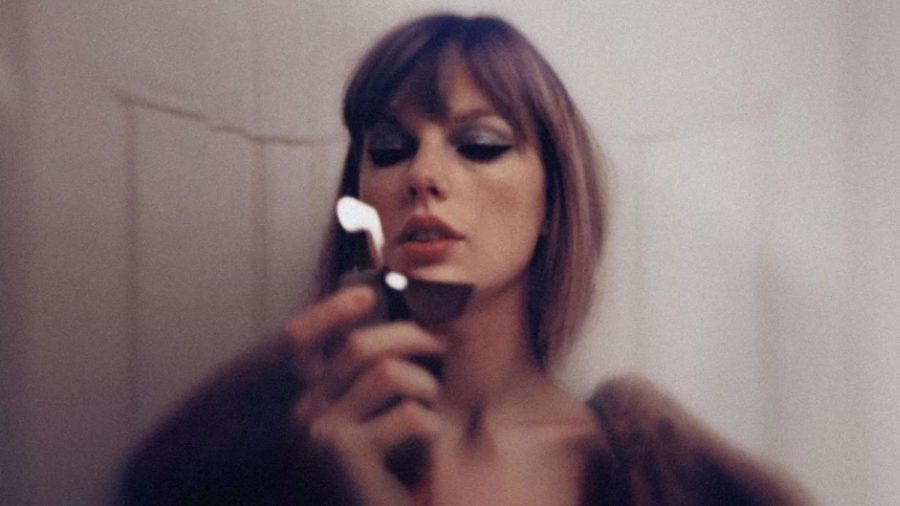Is Taylor Swift going to become unpopular again?
What the mixed reviews of “Midnights” mean for an artist whose popularity historically comes and goes
Taylor Swift’s newest album, “Midnights,” has topped the charts and crashed Spotify but isn’t receiving as much acclaim as her previous works.
November 18, 2022
Taylor Swift is an artist with a long, messy history. The early years were good, with Swift slowly phasing out her country roots for pop and becoming one of the most recognizable artists of the 2010s. Then she arguably got too big, and it became popular to hate Swift, or at the very least dislike her. She was accused of lying about whether she approved a lyric in Kanye West’s “Famous” where he said “I feel like me and Taylor might still have sex. Why? I made that bitch famous.” West also featured a nude wax model of Swift lying in bed next to him in the “Famous” music video to add insult to injury. Later, a leaked phone call revealed that Swift had not in fact approved the latter part of the lyric—“I made that bitch famous”—but at that point, the damage was done.
Before and during the release of Swift’s sixth studio album, “Reputation,” she experienced online ridicule and widespread hatred. People flooded her Instagram comments with the snake emoji, a reference to the insult given to her by West’s then-wife Kim Kardashian, and articles began to pop up with titles like “When Did You First Realize Taylor Swift Was Lying to You?” and “How Taylor Swift Played The Victim For A Decade And Made Her Entire Career.” Essentially, it was no longer cool to like Swift. And even if you didn’t have a problem with her supposed lie or her feud with the Kardashian-West clan, there were plenty of popular criticisms of the artist you could tote as your reason for disliking her: she’s whiny, she only writes songs about her ex-boyfriends, she’s played out, she’s annoying and she’s old. As for her music, while “Reputation” and her next album “Lover” were both admittedly large commercial successes, musically and lyrically they were nothing to write home about—that is, at least not compared to what Swift was going to put out next.
When the COVID-19 pandemic hit in 2020, Taylor capitalized on her time at home to release two surprise albums, “Folklore” and “Evermore.” Not only were they runaway hits, lauded for their lyricism and distinct departure from Swift’s previous upbeat style, but they provided a crucial chance for her to rectify her image. There she was, a major celebrity stuck at home and pursuing her hobbies like the rest of us. Swift began to circulate more and more on social media, and this time for a good reason: TikTok loved “Folklore.” Gen Z decided Swift was cool again, and back into the pop culture limelight she came.
Swift has only kept this momentum going by releasing “Fearless” (Taylor’s Version) and “Red” (Taylor’s Version) in 2021, both even more successful than they were during their initial debut. People screamed along to all 10 minutes of the new “All Too Well” cut, and sobbed to its short film starring Sadie Sink and Dylan O’ Brien. Most recently, Swift has come out with her tenth studio album, “Midnights,” and while it has topped the charts, reviews of the album from critics and fans alike are decidedly mixed. Some praise its return to pop, while others are confused what happened to the intricate lyrics and indie-esque sound of “Folklore.” And although no criticism of Swift has come close to what she was experiencing during the release of “Reputation,” I’m still afraid that her era of near-universal likeability is coming to an end.
The first cause for concern is the music of “Midnights” itself. The album is clearly a move back to the style of “Reputation” and “Lover,” both released when Swift was at her lowest popularity-wise—already a bad sign. “Midnights’” lyricism, as I’ve already mentioned, has also seemingly taken a step back—one particular lyric circulating on social media is “Sometimes I feel like everybody is a sexy baby,” from “Anti-Hero.” And although the “sexy baby” is a reference to an episode of “30 Rock,” those who mock the line see it as silly and cringey, criticism they apply to Swift as well. Some of today’s headlines read, reminiscent of those from the “Reputation” era, “Taylor Swift is peak millennial vibes,” “The Beautiful Banality of Taylor Swift’s Midnights” and, worst of all, “Taylor Swift’s ‘Midnights’ Album Is Shockingly Dull.” The album is either too boring or too dated and embarrassing. It’s also strange how no one seems to be able to write badly of “Midnights” without conflating it with who Swift is as a person, tied as she is to her albums’ marketing. If “Midnights” is no longer cool, then neither is Swift herself, and you’d better not be caught listening to anything on her discography—or at least, that’s the direction we seem to be heading in.
A potential reversal of Swift’s popularity would only be exacerbated by some of her recent controversies. First, she was revealed to have the highest carbon emissions of any celebrity, measured by how frequently she uses her private jet. Then, with the release of “Midnights,” she came under fire for including a scene in her “Anti-Hero” music video of herself stepping on a scale that read “fat,” intended to portray her struggle with eating disorders, but with many claiming that it actually perpetuated body image issues instead. If Swift has another public scandal, it’s easy to see cancel culture and the media at large coming for her as it has for many other celebrities, and she may not be able to recover.
Worse, she might not even need another public scandal to lose her new fanbase, although that would certainly hasten her fall from grace. We now live in an era where music trends are controlled—or at the very least are easily swayed—by TikTok. They also tend to come and go very quickly, with songs and artists remaining popular for a week and then fading into obscurity when the next big thing pushes them out of the spotlight. Swift has managed to stay popular for far longer than one week, I’ll grant you, but she’s also established in the mainstream music industry in a way that the younger artists blowing up on the app are not. Still, it’s only a matter of time before the cycle shifts and suddenly Swift is kicked aside for a younger, cooler and less over-saturated celebrity instead.
So is Swift definitively going to become unpopular again? While I think that most of the signs unfortunately point to yes, I will acknowledge that the recent surge of awareness of how the media treats female celebrities—think the 2021 Britney Spears documentary and the many movies from the past two years centering on Princess Diana—means that there is a glimmer of hope for Swift. Maybe, just maybe, people will be able to leave who she is as a person alone even if her music is no longer their cup of tea. As Swift continues to rerelease her masters and potentially put out even more original new music, we’ll just have to wait and see how the public reacts. Hopefully I’ll be pleasantly surprised.




